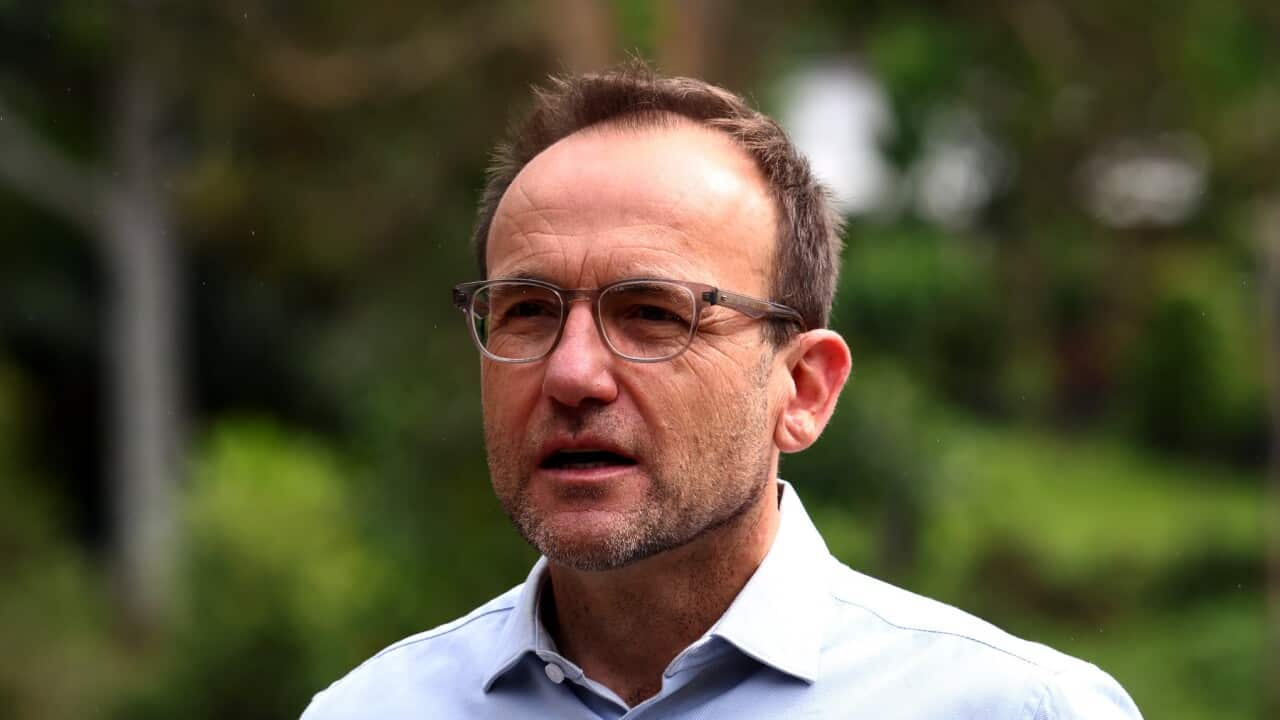TRANSCRIPT
One hundred days into his presidency, Donald Trump has received a less-than-glowing report card from his rivals - and the economy.
The United States economy had been predicted to grow 0.3 per cent.
Instead, it shrank by the same figure, signalling the first decline in three years.
When the news broke, senior Democratic Leader Chuck Shumer [[shoo-mer]] had strong words for the President.
"Today's new economic news showed that Donald Trump is running the American economy the way he ran his family business - into the ground."
That rebuke came as President Trump used a Cabinet meeting to pin the poor economic performance to the policies of his predecessor.
He described the lowered growth as a removal of what he called "distortions" of the figure in previous quarters, including high government spending.
"And I have to start off by saying that's Biden, that's not Trump, because we came in on January, these are quarterly numbers, and we came in and I was very against everything that Biden was doing in terms of the economy, destroying our country in so many ways."
But the lowering of the U-S G-D-P is linked to a surge in imports ahead of a new policy: the escalating tariffs placed on imported goods across industries, from almost all countries.
Economists say businesses have used the past quarter to buy up goods, as an unpredictable trade policy takes effect.
The President has imposed a 90-day pause on steep tariffs on imports, after dozens of countries approached his administration for reprieves.
The Wealth Alliance Managing Director, Robert Conzo, says Mr Trump must follow through with negotiations, fast.
"What he has is this 90-day reprieve, which is ticking down. He has to get some deals under his belt. That message has to come clear that countries not only came to the table, but they actually did negotiate."
One country does not have a seat at the table - China.
150 per cent tariffs have been levelled on all Chinese imports and they have been excluded from the 90-day reprieve given to other trading partners.
Speaking to his Cabinet, Mr Trump downplayed concerns over price rises on goods.
He said the U-S is doing well with tariffs, but China - which he calls the "Chief ripper-offer of the United States" - is not.
"Look, right now, and I told you before, they're having tremendous difficulty because their factories are not doing business. They made a trillion dollars with Biden - a trillion dollars, even a trillion-one with Biden selling their stuff. Much of it we don't need. You know, somebody said, oh, the shelves are going to be open. Well, maybe the children will have two dolls instead of 30 dolls, and maybe the two dolls will cost a couple of bucks more than they would normally."
The NASDAQ - which represents the top 3,500 U-S stocks - dipped on the back of the news, before recovering to end Wednesday higher than it opened.
Economists report the country is inching closer toward a possible recession but the broader picture remains uncertain.
That is because the latest data is a mixed bag; consumer spending slowed to 1.8 per cent - its weakest rate since mid-2023, it powers two-thirds of the economy and represents American households cutting back on household purchases.
The lacklustre figure combines with lower-than-expected employment numbers and the negative G-D-P.
Government spending dropped to minus 5.1 per cent ((-5.1%)) during the first three months of Donald Trump's term; in the previous quarter it hit four per cent growth.
But businesses bought big; investment grew almost 10 per cent in the quarter [[9.8%]] ahead of price rises from expected tariffs.
Private U-S investment boomed in the past three months, too, hitting its highest rate since late 2021.
U-S strategists are reporting on the news, which we've voiced.
Mark Hackett, chief market strategist at Nationwide, says the contradictory data muddied an already-unclear economic outlook.
"It's more frustration for the long-term investor because you're not getting a really good read on what the actual economy is doing. We need to know what's happening in the economy ... and reports like this don't give us a lot of useful data on that."
Matthew Miskin, co-chief investment strategist at John Hancock Investment Management, points to the uncertainty around trade.
"There's just massive distortion and volatility in the economic data right now because of the pull-through of tariffs. The GDP report doesn't help shake off this economic contraction fear that has been gripping markets."
Peter Andersen, founder of Andersen, Capital Management in Boston, agrees.
"This period where tariffs are trying to be negotiated and acknowledged by the market makes things extremely difficult to model and predict."
Meanwhile, the President is urging patience for his tariffs plan.
Hosting bosses of major companies at the White House, he listed big brands who have promised to do business in the U-S, including Novartis, G-E Aerospace, Toyota and Hyundai.
And as a volatile Wall Street reacts and rebounds off the latest reports, a coup from Kyiv.
Ukraine has signed a 10-year, US-Ukraine reconstruction investment fund, which would see the U-S pocket half the revenue from new rare earth mining licences in Ukraine.
In exchange, Ukraine has a measure of assurance of continued U-S support in its ongoing war with Russia.
The deal still needs to be ratified by the Ukrainian Parliament before it can take effect.













